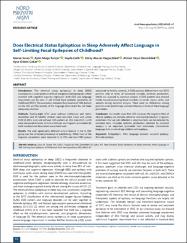Does Electrical Status Epilepticus in Sleep Adversely Affect Language in Self-Limiting Focal Epilepsies of Childhood

Göster/
Tarih
2023Yazar
Savaş, MerveTunçer, Aylin Müge
Çelik, İlayda
Yaşgüçlükal, Miray Atacan
Demirbilek, Ahmet Veysi
Çakar, Ayşe Özlem
Üst veri
Tüm öğe kaydını gösterKünye
Savaş M, Tunçer AM, Çelik İ, Yaşgüçlükal MA, Demirbilek AV, Çokar AÖ. Does Electrical Status Epilepticus in Sleep Adversely Affect Language in Self-Limiting Focal Epilepsies of Childhood? Noro Psikiyatr Ars. 2023 Feb 20;60(1):62-67. doi: 10.29399/npa.28086. PMID: 36911556; PMCID: PMC9999228.Özet
Introduction: The electrical status epilepticus in sleep (ESES) accompanies a wide spectrum of focal and generalized epilepsies, which manifest with cognitive-linguistic regression. Both ESES and language impairment can be seen in self-limited focal epileptic syndromes of childhood (SFEC). The association between the presence of ESES pattern on the EEG and the severity of the language impairment has not been adequately clarified.
Methods: Twenty-eight SFEC cases without intellectual and motor disabilities and 32 healthy children were recruited. Cases with active ESES (A-ESES, n=6) and without ESES pattern on EEG (non-ESES, n=22) were compared in terms of clinical features and linguistic parameters by both standard and descriptive assessment tools.
Results: The only significantly different clinical feature in the A-ESES group was the increased prevalence of polytherapy. While most of the linguistic parameters were impaired in A-ESES and non-ESES groups compared to healthy controls, A-ESES patients differed from non-ESES patients only in terms of decreased complex sentence production, which was assessed by narrative analysis. A-ESES patients also showed trends toward producing lower numbers of words, nouns, verbs, and adverbs during narrative analysis. There were no differences among patients under polytherapy and monotherapy in terms of these language parameters.
Conclusion: Our results show that ESES increases the negative effect of chronic epilepsy on complex sentence and word production. Linguistic distortions that are not reflected in objective tests can be detected by narrative tools. Complex syntactic production obtained by narrative analysis is an important parameter that extensively characterizes language skills in school-age children with epilepsy.

















